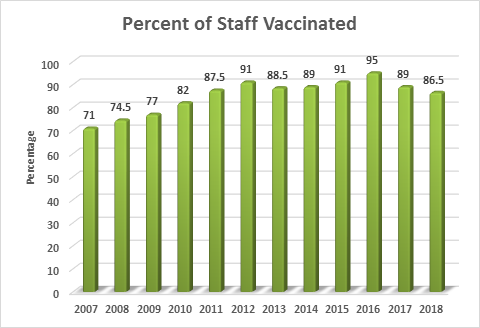Flu season is on its way. It’s important to take the necessary steps to prevent you and your family from contracting the flu. The last thing anyone wants is to miss out on the season’s festivities suffering from the flu with a fever and pounding headache.
5 General Facts about the Flu
- Flu season typically lasts from October to May, with the highest rates of infection being December to February.
- Flu-Infected people can be contagious before they have symptoms and are most contagious in the first 3-4 days.
- While most healthy people are able to recover from the flu with plenty of rest and liquids, complications like pneumonia, ear and sinus infections, and more can occur.
- Certain people are more susceptible to developing serious complications from the flu, including people with specific chronic medical conditions, pregnant women, seniors above 65 years of age, and children below 5 years of age.
- The best way to prevent contracting the flu is to get vaccinated every year.
Get vaccinated Against the Flu
Unless otherwise directed by your physician, everyone over the age of 6 months should get vaccinated for the flu every year. While it’s true that there’s still a chance you could contract the flu after being vaccinated, the vaccine will still lower the severity of your flu symptoms and help prevent hospital visits from flu complications. According to the Centers for Disease Control and Prevention, “during 2016-2017, flu vaccination prevented an estimated 5.3 million influenza illnesses, 2.6 million influenza-associated medical visits, and 85,000 influenza-associated hospitalizations.”
Medical Director of Emergency Services at Pullman Regional Hospital comments, “I remember the swine, or H1N1, flu season. It was horrible. As a health care provider, I was able to get the flu shot early. Unfortunately, my family didn’t and they all contracted influenza. I was especially concerned about my 2-year-old son and his moderately-severe illness. He made it through; however, that year hundreds of American children didn’t survive their influenza – 358 of them to be exact. It’s not a perfect prevention of influenza, but studies show that the only down-side to getting the influenza vaccine (compared to a placebo shot), is a sore arm. To most people, that’s worth it.”
At Pullman Regional Hospital, we encourage our entire staff and volunteers to get their flu shots to protect themselves and our patients, some of whom are at a higher risk of developing complications from the flu virus. In a continuing effort to increase the rate of voluntary employee participation in the annual “Shotoberfest” campaign, a minimum goal of 90% was established by the Board of Commissioners. Here’s a look at participation rates in past years.

Common misconceptions about the flu
Myth: The flu shot gives you the flu – Don’t be scared of getting the flu from the flu shot. The general vaccine given with a needle is made with an inactive virus that is not infectious.
Myth: You don’t need to get the flu shot every year – The flu virus is constantly changing, and your immune system’s antibodies slowly weaken over time. In order to be protected at all times, it is important to get a new flu shot each year.
Myth: Antibiotics will treat the flu – The flu is a viral infection, not a bacterial infection. Antibiotics are only used to treat bacteria, and are not effective against viruses.
Get Vaccinated for those who can’t
In certain cases, you may be advised not to receive the flu vaccine, including people managing certain chronic illnesses or those who have a history of rare but dangerous reactions to the vaccine. It is crucial for everyone else to get vaccinated to help protect those who can’t, like Kai Seshiki, Athletic Trainer at Pullman Regional Hospital.
Kai Seshiki, Athletic Trainer at Pullman Regional Hospital – Summit Therapy and Health Services
“When I was younger I received the flu shot every year, as my mom was a floor nurse and my dad worked in law enforcement. About the time I graduated university, the flu shot started affecting me in a different way. My body would react so poorly that I would spend weeks trying to recover, and the reaction began to escalate each time I received it. Around 2 years ago it required a series of steroid injections to calm down the reaction, and I lost months of time due to complications from the reaction. As soon as my daughter was out of her earliest years, my PCP and I decided that it was time to stop suffering with the after-effects of the shot.
I work in a K-12 public school as a certified athletic trainer, Summit Therapy, occasionally drop into the hospital when needed, have a grade school child, and have a spouse that works within the school system. My exposure rate to circulating germs is higher than most. I can’t get the flu shot anymore, but most people can. I can only do my best to protect myself, and therefore I rely on the rest of the population to help me by getting immunized. I can’t force anyone’s hand, but I can tell you how hard it is to deal with the flu at my current age. It is very difficult, and I have family and others that I am responsible for.”
When is the best time to get the flu vaccine?
It’s never too late to get vaccinated during flu season; however, for the best chance of being protected from start to finish, aim to get your flu shot by the end of October. Since it takes about two weeks for your body to develop antibodies against the flu virus, it’s important to be fully protected before flu season is in full swing. If you haven’t been vaccinated yet, make it a priority.
Even after getting vaccinated, there is still a chance of contracting the flu. Here are some day-to-day preventive steps to reduce your risk of getting the flu:
-
Wash your hands thoroughly and frequently
-
Avoid touching your mouth, eyes, and nose
-
Stay home when you are sick
-
Avoid large crowds when possible
-
Eat a healthy, balanced diet
-
Get enough sleep each night
Don’t wait to vaccinate
There’s no reason to wait. Visit your local primary care clinic or pharmacy to get vaccinated TODAY!
If you are a patient at one of the Pullman Regional Hospital clinics, call today to schedule your flu shot:
Pullman Family Medicine
Palouse Pediatrics - Pullman
Palouse Pediatrics – Moscow
For more information and a variety of resources on the flu, visit the Centers for Disease Control and Prevention website.
References -
Centers for Disease Control and Prevention (CDC)




